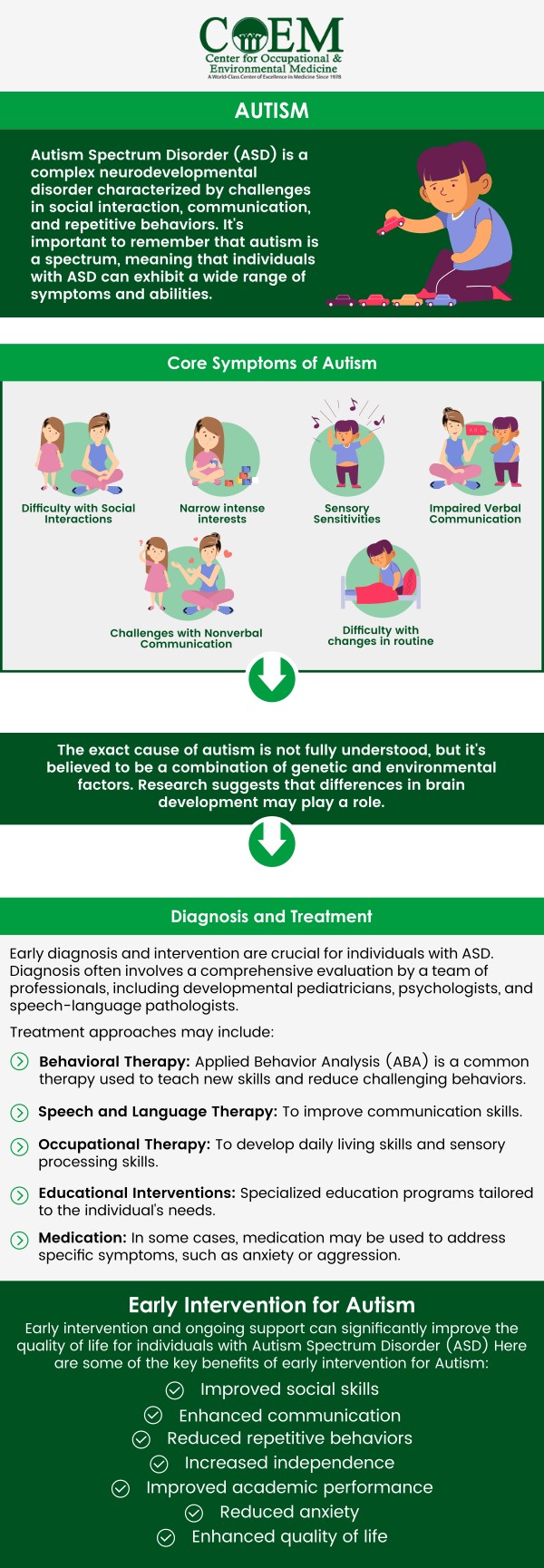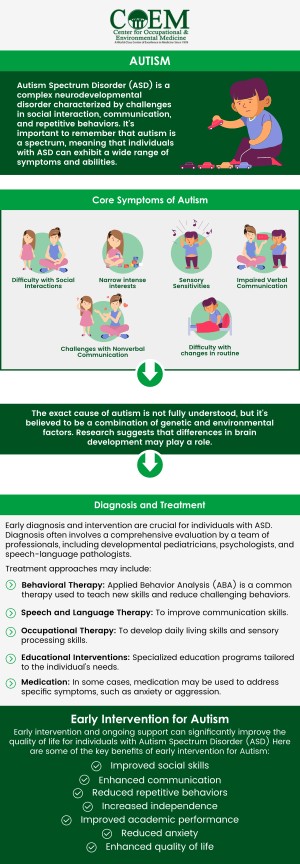Mitochondrial Dysfunction in Autism Spectrum Disorders Q&A
Mitochondrial dysfunction is a key factor in many cases of autism spectrum disorders, affecting energy production and brain function. Addressing this dysfunction can improve symptoms and overall development. At The Center for Occupational and Environmental Medicine (COEM), our team offers specialized care to assess and manage mitochondrial health in children with autism. We focus on personalized treatments to support your child’s well-being. For more information, contact us today or schedule an appointment online. We are conveniently located at 7510 North Forest Drive North Charleston, SC 29420. Patients routinely fly in to be evaluated by COEM, as we serve patients nationally and internationally. Find out if you have been exposed, extensive lab testing is available.


Table of Contents:
What is mitochondrial dysfunction in autism spectrum disorder?
What are the signs of mitochondrial dysfunction with ASD?
What causes mitochondrial dysfunction in ASD?
Is mitochondrial dysfunction common in individuals with ASD?
Mitochondrial dysfunction involves a disruption in how the body generates energy at the cellular level. This can have widespread effects on the brain, muscles, and organs that rely on energy to function. In children with autism spectrum disorder (ASD), the impact can be especially significant. Mitochondria are responsible for fueling cellular repair, communication, and growth. When that process breaks down, the result can affect emotional regulation, cognitive development, immune resilience, and physical stamina.
In many cases, mitochondrial issues are not isolated abnormalities. Research has linked alterations in mitochondrial metabolism to both children with ASD and their mothers. These imbalances can begin in utero, and in some cases, serve as early biomarkers that point to a higher likelihood of developing autism. Mitochondrial dysfunction may contribute to early neurodevelopmental disruption, especially in children who later display regression, sensory challenges, or resistance to conventional therapy. What might appear as a behavioral or sensory issue on the surface can stem from metabolic stress on a cellular level. The specialists at The Center for Occupational and Environmental Medicine (COEM) consider mitochondrial function as one part of the wider diagnostic picture, especially in cases where standard approaches fail to explain persistent symptoms. With targeted lab work, it’s possible to uncover whether a child’s mitochondria are under-functioning, and more importantly, what might be causing that shortfall in the first place.
Mitochondrial dysfunction often presents in patterns that overlap with other medical or developmental concerns. In children with ASD, these signs can include fatigue, low muscle tone, regression following illness or stress, and difficulties meeting developmental milestones. Children may appear to lose skills they once had, struggle with infections, or show signs of chronic digestive upset that doesn’t respond to conventional treatment. What links these symptoms is the body’s inability to meet energy demands, especially under stress. Physical signs such as poor endurance, muscle weakness, and drooping eyelids can also reflect deeper mitochondrial instability. These indicators often emerge alongside other ASD symptoms such as behavioral shifts, mood changes, or unexplained drops in function. These signs can point to a broader issue in energy metabolism, and mitochondrial function is part of the child’s larger physiological picture. Consulting with the specialists at COEM, who are sought out worldwide for their 45 years of ASD expertise and advanced methodologies, facilitates the uncovering of patterns that might otherwise be dismissed or misattributed to behavioral causes alone.
Mitochondrial dysfunction in autism is associated with various potential causes. Environmental and physiological stressors during early development can disrupt how the cells produce energy. Common contributors include mold exposure, infections, toxic chemical exposure, chronic inflammation, and nutritional deficiencies. Children with autism may already have underlying vulnerabilities that make them more susceptible to these disruptions, creating a cycle that amplifies dysfunction over time.
These stressors can impact critical mitochondrial pathways and prevent the body from keeping up with repair or detoxification processes. Over time, the results can show up as persistent fatigue, inconsistent responses to illness, and stalled developmental progress. COEM uses advanced diagnostic tools to identify mitochondrial stress markers that track how well the energy cycle is functioning. They examine how other systems, including gut health, nutrient status, and environmental burden, may be contributing to that dysfunction. Once these components are understood, treatment can be tailored to support mitochondrial recovery and improve the child’s resilience to stress and illness.
Several studies have reported alterations in mitochondrial metabolism in mothers of children with ASD as well as in newborns who develop the condition. Even when children do not meet the criteria for primary mitochondrial disease, many show signs of metabolic stress that affect how their systems manage energy. Several subtypes of mitochondrial dysfunction have been identified in individuals with ASD, including those linked to microbiome-derived metabolites, elevated acylcarnitines, and patterns of neurodevelopmental regression. Some of these changes may also be linked to maternal mitochondrial abnormalities during pregnancy.
Treatment targeting mitochondrial health has shown promising results in some cases, especially when combined with a full-spectrum approach that addresses immune, digestive, and environmental factors. For families navigating the challenges of autism, identifying mitochondrial dysfunction provides an opportunity to support the child’s progress and quality of life. At COEM, this kind of testing becomes part of a broader assessment that seeks to uncover what is holding the child back and how that can be addressed with precision and care.
Treatment for mitochondrial dysfunction in individuals with autism spectrum disorder (ASD) is available at The Center for Occupational and Environmental Medicine (COEM). For more information, contact us today or schedule an appointment online. We are conveniently located at 7510 North Forest Drive North Charleston, SC 29420. We serve patients from Charleston SC, Mount Pleasant SC, Summerville SC, North Charleston SC, Goose Creek SC, Ladson SC, Hanahan SC, James Island SC, John’s Island SC, Daniel Island SC, West Ashley SC, Moncks Corner SC, Sullivans Island SC, Folly Beach SC, Isle of Palms SC and all of South Carolina, Nationally, and Internationally. Patients routinely fly into Charleston to be evaluated by COEM and to enjoy this beautiful city, which is a Condé Nast and Travel and Leisure Top Domestic and International Tourist Destination.

Check Out Our 5 Star Reviews


Additional Services You May Like
- Functional Medicine
- Allergy and Autoimmunity
- Asthma and COPD
- Autoimmune Diseases
- Allergy and Immunology
- Anti Aging Medicine
- Autism and Children
- ADHD
- Bacterial Infections
- Chemical Toxicity
- Candida Fungal Problems
- Cancer Treatment
- Chronic Illness
- Chronic Inflammatory Response Syndrome (CIRS)
- Chronic Fatigue
- Cardiovascular Disease
- Carbon Monoxide Poisoning
- Chelation Therapy
- Depression
- Environmental Medicine
- Ear Ringing and Dizziness
- Fatigue Treatment
- Fertility and Preconception Care
- Gut Health
- Heavy Metal Toxicity
- Hormonal Imbalances
- Headaches and Migraines
- Hormone Balancing (Men & Women)
- Hepatitis
- Integrative Medicine
- Independent Medical Evaluations
- Influenza
- Lab Testing
- Mold Toxicity
- Malnutrition
- Neurodegenerative Disease
- Natural Hormone Balancing For Women
- Preservative-Free IV Therapy
- Stomach Acid Imbalance
- Smoking Cessation Program
- Skin Therapy (Anti-Aging)
- Swine Flu
- Thyroid
- Mold Toxicity
- Vitamin D
- Weight Loss Program
- Women’s Breast Health Formula

Additional Services You May Like
- Functional Medicine
- Allergy and Autoimmunity
- Asthma and COPD
- Autoimmune Diseases
- Allergy and Immunology
- Anti Aging Medicine
- Autism and Children
- ADHD
- Bacterial Infections
- Chemical Toxicity
- Candida Fungal Problems
- Cancer Treatment
- Chronic Illness
- Chronic Fatigue
- Cardiovascular Disease
- Chronic Inflammatory Response Syndrome (CIRS)
- Carbon Monoxide Poisoning
- Chelation Therapy
- Depression
- Environmental Medicine
- Ear Ringing and Dizziness
- Fatigue Treatment
- Fertility and Preconception Care
- Gut Health
- Heavy Metal Toxicity
- Hormonal Imbalances
- Headaches and Migraines
- Hormone Balancing (Men & Women)
- Hepatitis
- Integrative Medicine
- Independent Medical Evaluations
- Influenza
- Lab Testing
- Mold Toxicity
- Malnutrition
- Neurodegenerative Disease
- Natural Hormone Balancing For Women
- Preservative-Free IV Therapy
- Stomach Acid Imbalance
- Smoking Cessation Program
- Skin Therapy (Anti-Aging)
- Swine Flu
- Thyroid
- Mold Toxicity
- Vitamin D
- Weight Loss Program
- Women’s Breast Health Formula










